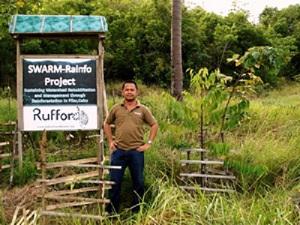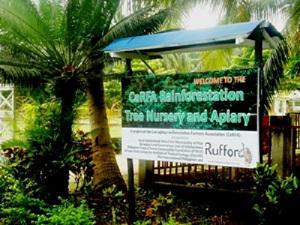Eufracio Maratas Jr.
The project aims to increase watershed stakeholders' support for Rainforestation – a community-based reforestation approach that promotes planting of native tree species in a closed canopy and high diversity forest farming system and integrates human food production and livelihood efforts.

Bandera SWARM-Rainfo Project Site.
The SWARM-Rainfo Project will be implemented in the town of Pilar also known as Ponson Island, one of four small islands that compose the Camotes Group of Islands in central Philippines. Local people source water from production springs located in the Municipal Watershed. Proper management and long-term sustainability in the area is therefore crucial. But vegetative cover continues to decline due to improper farm practices and land use resulting to insufficient water during the dry season and decrease of native tree species population. Attempts at reforestation resulted only in a few pocket forests which have very little effect in water availability and mostly planted with exotic species such as gmelina sp. The resulting mono-culture of trees increased vulnerability to insect attacks and diseases and caused nutrient imbalances in the soil that affected other plants. The project proponent therefore advocates the use of Rainforestation (http://rainforestation.ph).

Rainforestation was developed by Josef Margraf of GTZ and Paciencia Milan of the Visayas State University-Institute of Tropical Ecology (VSU-ITE), as a result of the Philippine-German Applied Tropical Ecology Program in 1994. It is considered an innovative community-based ecosystem approach, combining the necessities of rural development, biodiversity conservation and rehabilitation, and sound resource management that was developed on the island of Leyte in the Philippines. It is based on the assumption that a farming system in the humid tropics is increasingly more sustainable, the closer it is in its species composition to the original local rainforest (Friedhelm Göltenboth, University of Hohenheim, Germany).
This project will involve the organization of two community-based farmer groups who live or own lots inside the Municipal Watershed. They will then be trained on Rainforestation for them to adopt the approach and implement it in their claimed lots. An existing honeybee keeping project of the Can-ugkay Rainforestation Farmers Association (CaRFA) based in the village of Villahermosa will also be expanded so as to help the newly formed groups earn supplemental income and thus sustain interest in the reforestation project.